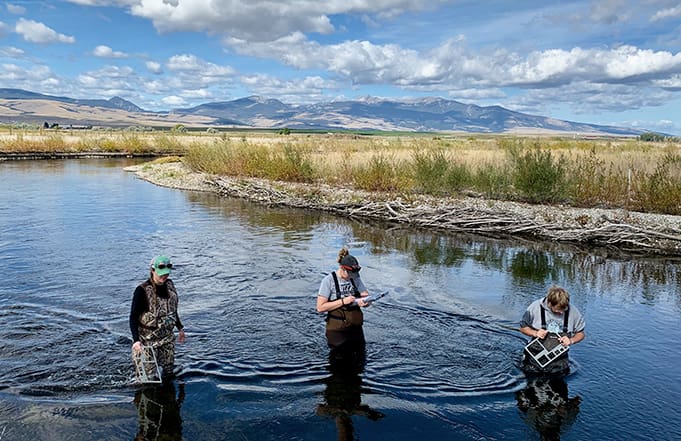January 27, 2020
Regents Professor of Geology Dr. Rob Thomas and Assistant Professor of Environmental Sustainability Dr. Arica Crootof have each received Montana National Science Foundation (NSF) Consortium for Research on Environmental Water Systems (CREWS) Workforce Development Seed Funding Awards. Both of these $10,000 grants will be used to support student research beginning in February, continuing over the summer and concluding this fall.

Water quality contamination is a pressing challenge in the Upper Clark Fork River. Through both of these grants, students from the University of Montana Western will be engaged in collecting physical and social science data to inform management decisions on local water systems and in the process, gain valuable research experience and professional skills.
Dr. Thomas and his students will work with Restoration Specialist Alex Leone of the Clark Fork Coalition to conduct a baseline assessment of (a) stream morphology, function, and stability, (b) sediment transport and distribution, (c) geochemistry, (d) macroinvertebrates, and (e) riparian vegetation on several miles of the Upper Clark Fork near Galen, Mont. The research will be conducted in the early fall of 2020 by upper-level undergraduate students in a capstone course entitled “Environmental Field Studies.”
Students will produce a final assessment report with data and recommendations for Montana Fish, Wildlife and Parks and the Department of Environmental Quality. These agencies will then use the data to construct remediation designs. The grant also includes travel funds for five students to attend the National Resource Damage Conference and share their work more broadly. According to Thomas, this work can only be done because of Montana Western’s unique Experience One scheduling system.
“It’s our freedom from scheduling that allows us to immerse students in authentic practice in the discipline. The report the students construct and the skills they develop are all crucial portfolio pieces for jobs and graduate school. Few undergraduate students in the United States get a chance to work on such a high-profile stream remediation project, and the payoffs will extend well beyond their class,” Thomas explained.
Dr. Crootof’s grant will fund student research in two of her courses (“Sustainable Natural Resources Management” in Block 6 and “Human Dimensions of Global Change” in Block 1) and will allow for an additional 400 hours of paid student research over the summer. The focus of this research is to understand public perceptions of water contamination and public health concerns regarding the Warm Springs Ponds near Anaconda, Mont. to inform reclamation decisions.
By training University of Montana Western students in social science research design and application, students will be working to document recreational use and public perceptions of water quality and contamination of the Warm Springs. As Dr. Crootof explains, “I am excited to bring research methods into my courses and have students experience both the challenges and rewards of collecting observation, survey, interview, and public records data and learn first-hand the importance of not just collecting good data, but also how to relay new knowledge to decision-makers that is both accessible and usable.”
Dr. Crootof also agrees that Montana Western’s unique block scheduling is paramount to engaging undergraduate students in field methods and research. “From research design, to data collection and analysis, to report writing, and public presentations, UMW students will be engaging in collaborative, interdisciplinary research projects that will inform reclamation needs for the Upper Clark Fork River.”
For more information regarding Dr. Thomas’s and Dr. Crootof’s upcoming courses and projects, you can contact them via email at [email protected] and [email protected]. To find out more about the CREWS project and all of their study sites around Montana, visit the Montana NSF EPSCoR website.